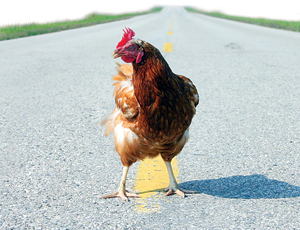What do chickens have to do with trucks? Plenty, if the trucks are not built in North America and are being imported into the U.S. Pickup trucks and other small trucks are subject to a 25% “chicken tax” protectionist tariff imposed by the U.S. in 1963 after Germany tripled the duty on frozen U.S. chicken products coming into that country. Over four decades later, the world has changed and some innovative products are caught in a bind.

Vehicle manufacturing now is clearly a global enterprise, as demonstrated by the sale or pending sale of some of bankrupt Chrysler’s and General Motor’s assets to manufacturers abroad. Parts now are sourced all over the world, and the winners are the ones that offer the most value for the price, no matter where they are made.
The chicken tax potentially is in play over two innovative vehicles: One is Ford Motor Co.’s Transit Connect small van, which the firm builds in Turkey and wants to sell in the U.S. starting next month. The other is a compact diesel pickup truck that Indian manufacturer Mahindra and Mahindra Ltd. wants to offer U.S. buyers later this year.
The tax started in a classic trade war between nations but now is a powerful protectionist tool for U.S. interests. The hefty levy forced Honda, Nissan and Toyota to build trucks here, but Ford and Mahindra have other ideas until they can prove the market is ready for their products.
Both companies’ solutions are a bit kooky and somewhat wasteful, but apparently they will work. Ford will import its vans with a second row of seats, even though it believes most will be used in a format with only front seats. After the vans arrive in the U.S., Ford will yank out the seats and another firm will recycle the steel and shred the rest for use as landfill cover. How green is that?
Mahindra, on the other hand, plans to ship complete knockdown kits of its truck to the U.S. and then assemble them at facilities of other manufacturers, possibly in Ohio.
Protectionist tariffs can be harmful in the long run, as the recent bankruptcies demonstrate. They stifle innovation and induce wasteful business practices, both among the protected and those on the outside. This tariff no longer has anything to do with chickens; it is just a bad egg. It would be nice to build these products in the U.S. but until the market rules in their favor, they should be allowed in duty-free.

Post a comment to this article
Report Abusive Comment